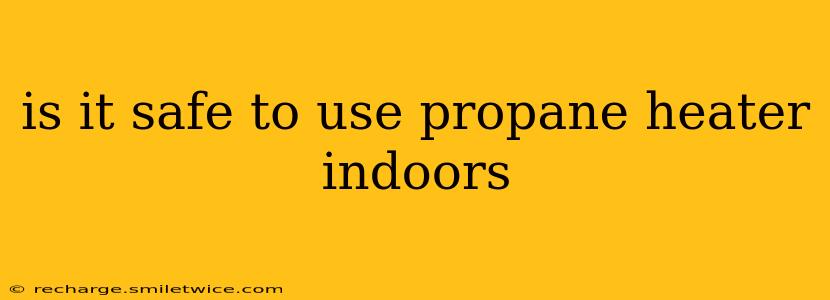Using a propane heater indoors can be a tempting way to stay warm, especially during power outages or in unheated spaces. However, it's crucial to understand the significant risks involved before you even consider it. The short answer is: generally, no, it's not safe to use a propane heater indoors unless specific safety precautions are met and the heater is specifically designed for indoor use.
Propane heaters, while efficient at producing heat, release byproducts of combustion – carbon monoxide (CO) and water vapor. Carbon monoxide is an odorless, colorless, and deadly gas. Breathing in even small amounts can lead to serious health issues, and high concentrations can be fatal. The water vapor released can also contribute to increased humidity levels, potentially leading to mold growth.
What Makes Propane Heaters Dangerous Indoors?
The primary danger lies in the potential for carbon monoxide poisoning. Indoors, there is less ventilation to disperse the CO, leading to a buildup of the gas in the air. This buildup can quickly reach lethal levels, especially in poorly ventilated spaces. Even properly vented propane heaters can pose a risk if the ventilation system malfunctions or is improperly installed.
Types of Propane Heaters and Their Indoor Suitability
Not all propane heaters are created equal. Some are designed for outdoor use only, while others are specifically engineered for indoor use with safety features like oxygen depletion sensors. Never use an outdoor propane heater indoors.
Here's a breakdown:
-
Unvented Propane Heaters: These heaters are never safe for indoor use. They directly release combustion byproducts into the room's air. This poses a significant risk of carbon monoxide poisoning and should be avoided at all costs.
-
Vented Propane Heaters: These heaters have a vent that expels combustion byproducts outside. They are generally safer for indoor use, provided they are properly installed and maintained by a qualified professional. Regular inspections of the venting system are essential to ensure its effectiveness.
-
Direct-Vent Propane Heaters: These heaters draw combustion air from outside and exhaust the byproducts directly outside. They are considered safer than other types for indoor use because they don't pull air from inside the space, minimizing the risk of backdrafting.
What Safety Precautions Should I Take?
Even with a vented propane heater designed for indoor use, several safety precautions are critical:
-
Professional Installation: Always have a qualified technician install and inspect your propane heater. Improper installation can severely compromise safety.
-
Proper Ventilation: Ensure adequate ventilation in the room where the heater is used. This helps to dilute any CO that might escape, even with a vented system. Open windows slightly or use a ventilation fan.
-
CO Detectors: Install working carbon monoxide detectors on every level of your home, including near sleeping areas. These detectors are vital for early warning in case of a leak. Test them regularly.
-
Regular Maintenance: Schedule annual maintenance checks by a qualified technician. This ensures your heater is operating safely and efficiently.
-
Never Use in Enclosed Spaces: Avoid using a propane heater in small, enclosed spaces like bathrooms, bedrooms, or tents, even if vented. The risk of CO buildup remains significant.
-
Follow Manufacturer Instructions: Always follow the manufacturer's instructions meticulously. This includes details about ventilation, installation, and maintenance.
How Can I Stay Warm Safely Indoors Without a Propane Heater?
There are several safer alternatives for staying warm indoors:
- Electric space heaters: These are generally a safer option, though it’s important to choose one with automatic shut-off features.
- Wood-burning stoves (with proper ventilation): While effective, require careful handling and chimney maintenance to prevent fires and carbon monoxide poisoning.
- Adding insulation to your home: This improves the overall energy efficiency and warmth of your space.
Can I Use a Propane Heater in a Garage?
The safety of using a propane heater in a garage depends entirely on the type of heater, ventilation, and the garage's construction. Generally, it's not recommended. Garages often have poor ventilation, and the presence of flammable materials increases the risk of fire or explosion. If you must use one, ensure it's a properly vented heater, professionally installed, and that the garage is well-ventilated. CO detectors are absolutely essential.
What are the Symptoms of Carbon Monoxide Poisoning?
Symptoms of carbon monoxide poisoning can mimic the flu and include:
- Headache
- Dizziness
- Weakness
- Nausea
- Vomiting
- Chest pain
- Shortness of breath
If you experience any of these symptoms, immediately leave the area and seek fresh air. Contact emergency medical services.
In conclusion, while propane heaters can be efficient sources of heat, the risks associated with indoor use are substantial. Only use propane heaters designed for indoor use, with proper installation and ventilation. Prioritizing safety and considering safer alternatives is always the best course of action.
